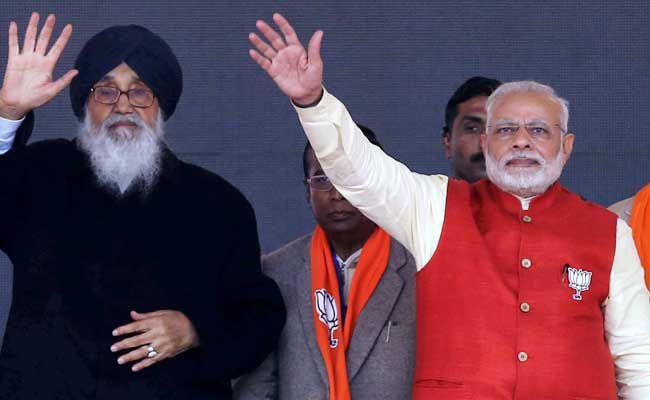
There will be no re-union of the BJP and Akali Dal in Punjab - an alliance that fractured in September 2020 amid sharp differences over the centre's (now-scrapped) three farm laws - ahead of the 2024 Lok Sabha election. The BJP this week confirmed it will contest the state's 13 seats on its own.
The Akalis, though, have claimed a mismatch in core ideologies was the reason why an alliance could not be reformed. The state party has also hinted at plans to contest the 2027 Assembly election on its own, and is expected to use the Lok Sabha poll as a chance to refine its panthic agenda.
Sources said such an outreach - built on a strong regional identity and development of the Akali Dal as a regional socio-cultural and political force - clashes with the BJP's nationalist political ideology.
Sources stressed that over and above disagreements on political, religious, and socio-cultural issues, the Akali leadership is aware of the BJP's 'decimating regional forces' image, which has been red-flagged by parties in other parts of India, such as Bengal's Trinamool and the DMK in Tamil Nadu.
READ | BJP To Go Solo In Punjab, 4-Way Fight For 13 Lok Sabha Seats
Many Akali leaders believed the BJP wanted to piggyback on their party and its vote base to reach its target of 400 seats for the party-led National Democratic Alliance. The Akali's fear was also that the BJP would demand more seats for the 2027 election, if the Lok Sabha exercise were to be successful.
Also, unlike 1996 - when the BJP and Akalis tied up - the latter set conditions for its return, including its November 2019 promise of releasing Sikh prisoners who had completed their terms.

Late Akali Dal patriarch Parkash Singh Badal and Prime Minister Narendra Modi (File).
Back in 1996 the Akali Dal had offered unconditional support for the BJP, which it declared signified a Hindu-Sikh unity. That bond broke 24 years later amid the farmers' protest.
All of this was in a carefully-worded resolution passed by the Akali Dal last week.
Akali boss Sukhbir Singh Badal told reporters today his party is "not just driven by number games... we are a 103-year-old movement with a clear vision, and we have always stood by and for our principles".
"The Akali Dal has made our position and priorities clear... it is principles above politics and issues above any political numbers. Our party is committed to safeguarding Panth and Panjab," he said.
Shiromani Akali Dal is not just a political party driven by number games, unlike some national parties. We are a 103-year-old movement with a clear vision and we have always stood by and for principles. That will continue to be our goal. Shiromani Akali Dal core committee has… pic.twitter.com/aQIyndCbZf
— Sukhbir Singh Badal (@officeofssbadal) March 26, 2024
Last week too the Akali gave a broad outline of these concerns, and said it would "continue to put principles above politics... and never deviate from its historic role as a champion" of all Punjabis.
"As the sole representatives of the Sikhs and of all Punjabis, the party will continue its fight for more powers and genuine autonomy to the states," it said, in a resolution seen as tacitly accepting the party's decreased status among Punjab voters.
Akali vs BJP vs AAP vs Congress In Punjab
The Akalis going solo means Punjab's 13 seats will see a four-way contest, with the Congress and the ruling Aam Aadmi Party also in the fray. The Congress and the AAP are both members of the INDIA opposition bloc but have failed, so far, and appear unlikely now to agree any seat-share deal.
In 2019, the Congress - then led by ex-Chief Minister (and former Congressman) Amarinder Singh - claimed eight of the state's 13 seats. The BJP and the Akalis won two each. The AAP got one.
The Akali Dal secured over 27 per cent of the votes, while the BJP got less than 10 per cent. The sizeable difference underlines why the saffron party was hoping to get the Akalis on its side.
READ | Punjab BJP Rules Out Alliance With Akali, Says Will Fight Polls Alone
The Assembly election that came three years was the first time in five poll cycles that the Akali Dal and the BJP were not allies. Prior to that, seat-sharing was always 94-23 in favour of the Akalis.
In the 2022 election the two contested separately, and were each wiped out. The Akali Dal won just three seats (four including its ally Bahujan Samaj Party's sole seat) while the BJP got just two.
That was a sharp decline in fortunes for the Akali Dal; five years earlier it had won 15 of its allotted 94 seats but the BJP fared just as poorly - winning only three seats. This, in turn, was five years after the Akali-BJP combine won the election; the Akalis won 56 of its 94 seats and the BJP 12 of its 23.
For the 2024 Lok Sabha election, Punjab votes in a single phase on April 19.
Results will be declared on June 4.
NDTV is now available on WhatsApp channels. Click on the link to get all the latest updates from NDTV on your chat.
Track Latest News Live on NDTV.com and get news updates from India and around the world

